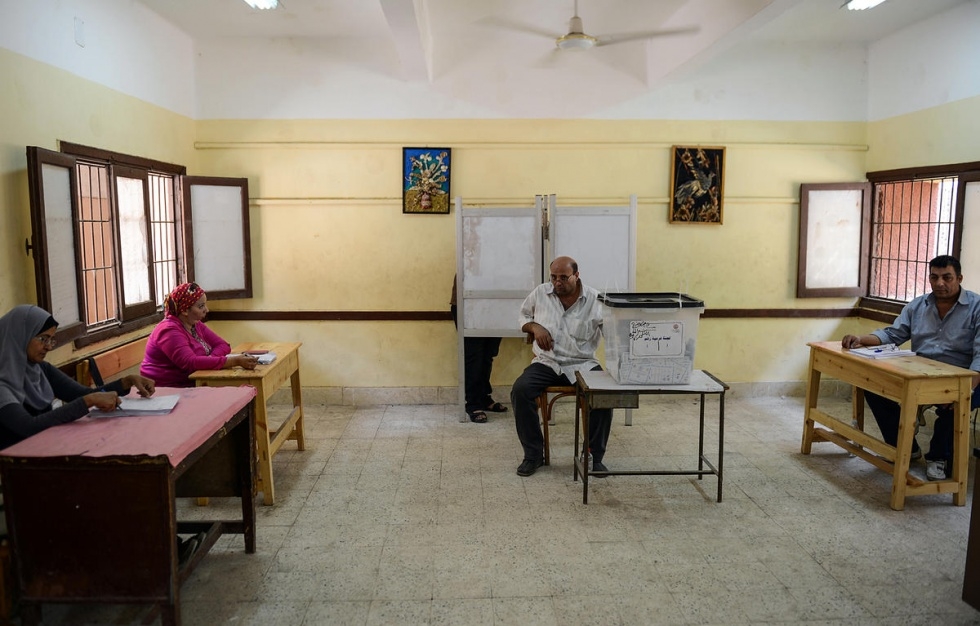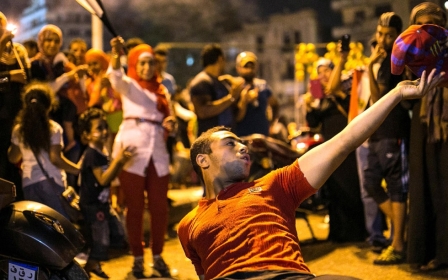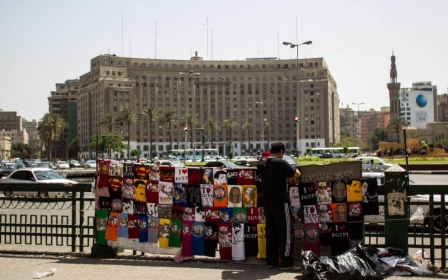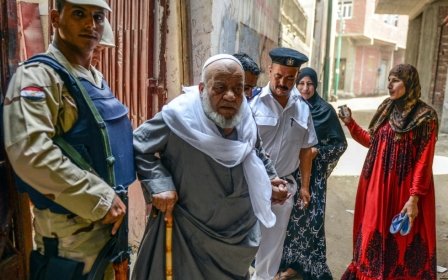Egypt democracy questioned as Sisi 'wins' poll

The election as Egypt's president of ex-army chief Abdel Fattah al-Sisi was never in doubt, with only a token challenger and the banned Muslim Brotherhood and liberal youth groups boycotting the vote.
Preliminary results from this week's two-day election, that was extended to three days because of low turnout, gave 96 percent of votes to the retired field marshal who ousted democratically elected president Mohamed Morsi last July.
Hamdeen Sabbahi, who won less than four percent, was criticised for taking part in what rights activists and political analysts say was a "cosmetic" election to rubber stamp Sisi's formal accession to power.
The election was boycotted not only by the Brotherhood of Morsi, Egypt's first civilian and freely elected president, it was also shunned by the April 6 youth group that spearheaded the 2011 uprising that toppled Hosni Mubarak.
Their absence was a major contributing factor in Sisi failing to get the sweeping endorsement hoped for to put a stamp of legitimacy on Morsi's ouster and the subsequent bloody crackdown on the Brotherhood.
Indeed, after voting was extended for a day, authorities put turnout at about 25 million people, or 47 percent, down from nearly 52 percent when Morsi was elected in 2012.
Both the Brotherhood and April 6, who are at opposite ends of the political spectrum, have been blacklisted by the authorities.
TV hysteria
The Big Pharaoh, a well-known blogger, said on Twitter that the winners of the election were "1-People who didn't vote 2-Mr. Sisi. 3- Mr. Invalid Ballots 4- Mr. Sabbahi."
Mona Seif, a founding member of "No to Military Trials for Civilians," one of Egypt's most active youth groups, cast doubts on the "legend of massive participation" and criticised "two days of hysteria" as television anchors alternated insults, supplications and threats to get Egyptians to vote.
A European Union team that observed the election regretted Thursday the lack of participation of some "stakeholders," a likely reference to the Brotherhood and youthful dissidents.
It also said "private media provided candidate (Sisi) with more than twice the coverage provided to candidate Sabbahi."
"Stakeholders opposed to the roadmap received no media coverage," it added.
Since Morsi's ouster, Sisi has been hailed as a hero and a saviour by the overwhelming majority of private media.
While interviewing the retired field marshal ahead of the election, many television anchors openly expressed their admiration for him, even as he remained vague about his electoral programme, arguing that it should be kept secret for national security reasons.
"Field marshal with no war, candidate with no programme, president with no election", opposition group Askar Kazibun (Military are liars in Arabic) wrote on Twitter.
The authorities are touting the election as a milestone on the road to democracy following Morsi's ouster, but Human Rights Watch said the state crackdown "stripped these elections of real meaning."
At least 1,400 Morsi supporters have died in street clashes and more than 15,000 others been jailed since the crackdown began in August.
'Where did all these votes come from?'
On top of that, dozens of young activists have been jailed for violating a law banning all but police-authorised protests.
"The intense crackdown on dissent over the last 10 months has created a repressive environment that severely undermines the fairness of the elections," HRW said.
Rights advocates have also criticised the decision to extend voting as raising questions about the democratic credentials of the election and even questioned the authorities' skills.
"By changing the rules at the last moment, the (electoral) commission took a political decision that raised many doubts" regarding the election's democratic nature, Adel Ramadan, from the Egyptian Initiative for Personal rights, told AFP.
And Middle East expert Karim Bitar said "not only did the new authorities show their lack of desire for democracy, they also proved to be very incompetent in the organisation of the process, which is a bad omen for the future."
In 2012, in the presidential election organised after Mubarak's overthrow, Morsi secured around 13 million votes in a run-off against Ahmed Shafiq, Mubarak's last premier.
Ahmed Samih, head of the Andalus Institute for Tolerance, wonders ironically where Sisi got all his votes.
"Sisi's campaign claims that he secured 23 million votes. In 2012, the two candidates of the second round, gathered together 26 million voices. But this year the Muslim Brotherhood are boycotting. Where did all these votes come from?"
Egypt may collect $2bn from non-voters
Egyptian authorities could collect up to 14.3 billion Egyptian pounds (roughly $2 billion) if they make good on their warning to impose a fine of 500 Egyptian pounds (around $71) on Egyptians who failed to cast ballots in just-concluded presidential polls, according to a tally conducted by Anadolu Agency.
According to a tally by AA reporters at main polling stations, where vote counting took place nationwide, turnout stood at 47 percent of Egypt's 54 million eligible voters.
This means that that around 28.6 million eligible voters failed to vote, entitling the authorities to collect a total of some 14.3 billion Egyptian pounds from them.
A lower-than-expected turnout in the first two days of voting prompted electoral officials to push voters to go to the polls. Their gestures, however, failed to boost turnout.
But Egyptian interim President Adly Mansour on Thursday lauded the public's participation in the polls.
"The interim president applauds the peaceful and democratic atmosphere in which the election was held," presidential spokesman Ehab Badawi said in a statement.
"The election was yet more proof of the ability of the Egyptian people to make history," Badawi added.
Meanwhile, Sisi's campaign on Thursday thanked rival candidate Sabahi for what it described as his "honest competition."
"We extend our thanks to presidential candidate Hamdeen Sabahi who - together with his campaign - provided a respectable example of honest and noble competition," al-Sisi's campaign said in a statement.
The campaign also thanked the Egyptian people for participating in the election.
Voter turnout between 10 and 12 percent only
However, opponents of Egypt's interim authorities on Thursday voiced doubts about the preliminary election results.
Some critics described the election as "satire," saying early unofficial poll results contradicted the situation on the ground.
"The announced election results contradict the election voter turnout," Magdi Qorqor, spokesman for the National Alliance for the Defense of Legitimacy, which supports ousted president Mohamed Morsi, said.
"The majority of the public, along with the alliance's supporters, boycotted the election," he told Anadolu Agency.
Qorqor said estimates by the National Alliance for the Defense of Legitimacy put election voter turnout between 10 and 12 percent only.
The same message was affirmed by the Strong Egypt Party, which said the public boycott of the election had cast doubt on media claims that the public was united on the latest political developments in Egypt.
"It shows that this unity is nothing but the making of the media," the party said in a statement.
"The people are no longer able to accept media lies that try to gloss over the realities on the ground," the party added.
The April 6 protest movement, which opposes the current authorities, described the declared election results as "lies."
"Civil society reports about the election say that 12 million people at most participated in the event," Mohamed Youssef, a member of the movement's politburo, told AA.
He said his movement would continue to maintain the "Against You" campaign - which it launched against al-Sisi a few weeks ago - even after he is officially sworn in as president.
Middle East Eye propose une couverture et une analyse indépendantes et incomparables du Moyen-Orient, de l’Afrique du Nord et d’autres régions du monde. Pour en savoir plus sur la reprise de ce contenu et les frais qui s’appliquent, veuillez remplir ce formulaire [en anglais]. Pour en savoir plus sur MEE, cliquez ici [en anglais].




